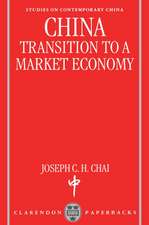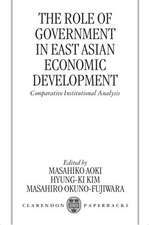The Japanese Firm: The Sources of Competitive Strength
Editat de Masahiko Aoki, Ronald Doreen Limba Engleză Paperback – 5 sep 1996
| Toate formatele și edițiile | Preț | Express |
|---|---|---|
| Paperback (1) | 644.12 lei 31-37 zile | |
| OUP OXFORD – 5 sep 1996 | 644.12 lei 31-37 zile | |
| Hardback (1) | 271.22 lei 31-37 zile | |
| Clarendon Press – 25 mai 1994 | 271.22 lei 31-37 zile |
Preț: 644.12 lei
Preț vechi: 906.76 lei
-29% Nou
Puncte Express: 966
Preț estimativ în valută:
123.25€ • 128.68$ • 102.01£
123.25€ • 128.68$ • 102.01£
Carte tipărită la comandă
Livrare economică 25-31 martie
Preluare comenzi: 021 569.72.76
Specificații
ISBN-13: 9780198292159
ISBN-10: 0198292155
Pagini: 424
Ilustrații: line figures, tables
Dimensiuni: 156 x 233 x 25 mm
Greutate: 0.62 kg
Ediția:Revised
Editura: OUP OXFORD
Colecția OUP Oxford
Locul publicării:Oxford, United Kingdom
ISBN-10: 0198292155
Pagini: 424
Ilustrații: line figures, tables
Dimensiuni: 156 x 233 x 25 mm
Greutate: 0.62 kg
Ediția:Revised
Editura: OUP OXFORD
Colecția OUP Oxford
Locul publicării:Oxford, United Kingdom
Recenzii
This is an excellent collection of papers for which the authors, the editors and the conference organizers should be congratulated. I found valuable insights in almost every chapter, and the whole was even better than the sum of its parts. One point that was brought out by a number of authors was what the editors referred to in their introduction as `systemic awareness' - that specific attributes of the Japanese firm should not be considered in isolation, as they are all interrelated elements of a broader system. This book brings together many of these elements, and provides the reader with that vital systemic awareness.
Many of the papers reflect the use of the new institutional economies to explain the nature of the Japanese firm and the sources of its competitive strength. They also display a laudable attempt to show the dependency between institutions, something which is important, but difficult, to do ... The papers are not only theoretical and empirical studies of the Japanese case, they also often contain a comparative aspect ... the account of the Japanese firm under the wartime planned economy given by Tetsuji Okazaki is fascinating ... higly informative and expertly combines modern approaches to the theory of the firm with empirical studies of a diverse range. I recommend this volume for those interested in the firm, the Japanese firm, and the skilful application of theories of the firm. The papers will undoubtedly enhance people's knowledge of the Japanese economy, but also stimulate new avenues of enquiry.
This is an excellent collection of papers for which the authors, the editors and the conference organizers should be congratulated. I found valuable insights in almost every chapter, and the whole was even better than the sum of its parts.
'all of the essays are to be highly recommended.'
Fourteen useful papers that attempt to improve our understanding of the role of the firm in the Japanese economic system, as well as explain the corporate success of Japan. I hoipe we will not be required to wait too long for a similar volume that examines the traumas of the past five years. - Long Range Planning. April 1998.
Many of the papers reflect the use of the new institutional economies to explain the nature of the Japanese firm and the sources of its competitive strength. They also display a laudable attempt to show the dependency between institutions, something which is important, but difficult, to do ... The papers are not only theoretical and empirical studies of the Japanese case, they also often contain a comparative aspect ... the account of the Japanese firm under the wartime planned economy given by Tetsuji Okazaki is fascinating ... higly informative and expertly combines modern approaches to the theory of the firm with empirical studies of a diverse range. I recommend this volume for those interested in the firm, the Japanese firm, and the skilful application of theories of the firm. The papers will undoubtedly enhance people's knowledge of the Japanese economy, but also stimulate new avenues of enquiry.
This is an excellent collection of papers for which the authors, the editors and the conference organizers should be congratulated. I found valuable insights in almost every chapter, and the whole was even better than the sum of its parts.
'all of the essays are to be highly recommended.'
Fourteen useful papers that attempt to improve our understanding of the role of the firm in the Japanese economic system, as well as explain the corporate success of Japan. I hoipe we will not be required to wait too long for a similar volume that examines the traumas of the past five years. - Long Range Planning. April 1998.











